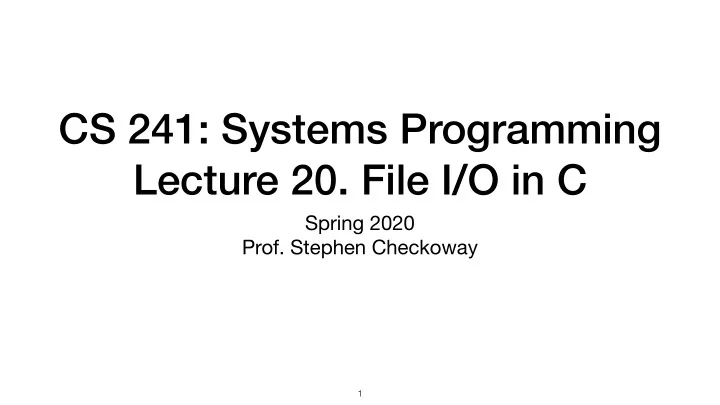

CS 241: Systems Programming Lecture 20. File I/O in C Spring 2020 Prof. Stephen Checkoway 1
Streams C's view of Input/Output Sequence of bytes Physical I/O characteristics are concealed (it's an abstraction ) ‣ Files ‣ Terminal ‣ Network ‣ Devices 2
Unix I/O Unix treats all I/O as reading or writing a file ‣ mice ‣ printer ‣ keyboard ‣ networking ‣ screen ‣ disk files Lower level I/O will be covered later (file descriptors) 3
File pointers C standard library uses file pointers to associate a file with a stream FILE *stdin; Treat as opaque ‣ You can't manipulate the FILE structure's members directly, must use functions 4
Buffering Output data is stored in a bu ff er (an array) when writing until there is "enough" data to write to the device Bu ff ering types ‣ Unbu ff ered: data is written to device immediately ‣ Line bu ff ered: data is written after each newline ‣ Fully (or block) bu ff ered: data is written in blocks once the block is full int fflush(FILE *file); 5
Standard file pointers in Unix stdin — Line bu ff ered if connected to a terminal; otherwise fully bu ff ered stdout — Line bu ff ered if connected to a terminal; otherwise fully bu ff ered stderr — Unbu ff ered Recall redirection and pipelines ‣ ./a.out < input.txt > output.txt ‣ ./a.out | filter1 | filter2 > output.txt 6
Opening files as streams FILE *fopen(char const *filename, char const *mode); ‣ NULL on error, errno set to indicate error Mode: ‣ "r" reading, at beginning ‣ "r+" read/write, at beginning ‣ "w" write, create/truncate ‣ "w+" read/write, create/truncate ‣ "a" write, create, always at end ‣ "a+" read/write, create, always at end ‣ In addition to +, there are also modifiers b for binary streams and x for eXclusive ( fopen(path, "wx") fails if path already exists) 7
If we want to read the contents of a text file into memory, modify it, and then write it back to the same file, which call to fopen() should we use? A. FILE *fp = fopen(path, "r+"); B. FILE *fp = fopen(path, "w+"); C. FILE *fp = fopen(path, "a+"); D. FILE *fp = fopen(path, "rb"); E. FILE *fp = fopen(path, "wx"); 8
Stream I/O single char int getchar(); // gets a char from stdin int getc(FILE *stream); // macro int fgetc(FILE *stream); // actual function int putchar(int c); // writes a char to stdin int putc(int c, FILE *stream); // macro int fputc(int c, FILE *stream); // function 9
Stream I/O multiple chars // Reads a line (up to a maximum size) char *fgets(char *str, size_t size, FILE *stream); // Writes str to stdout and appends a newline int puts(char const *str); // Writes str to file but does not append a newline int fputs(char const *str, FILE *stream); 10
Analogous to puts() vs. fputs() , there's a function char *gets(char *str); that reads a line from stdin and stores it in str . This function should never be used under any circumstance! Why not? A. Including the function was a D. A too-long line may let an attacker mistake by the C designers take control of the program B. There's no bounds checking on E. All of the above the input C. A too-long line may crash the program 11
Checking for EOF/error int feof(FILE *stream); // returns nonzero if stream is at the end int ferror(FILE *stream); // returns nonzero if stream had an error 12
#include <stdio.h> int main( int argc, char *argv[argc]) { FILE *input = fopen(argv[1], "r"); FILE *output = fopen(argv[2], "w"); char str[1024]; while (fgets(str, sizeof str, input) != 0) { if (fputs(str, output) == EOF ) break ; } if (ferror(input) || ferror(output)) return 1; return 0; } 13
Error information #include <stdio.h> #include <errno.h> extern int errno; // libc funcs set this on failure char *strerror(int errnum); // human-readable error string void perror(char const *str); // prints error on stderr perror(str) is (essentially) if (str != 0 && str[0] != 0) fprintf(stderr, "%s: %s\n", str, strerror(errno)); else fprintf(stderr, "%s\n", strerror(errno)); 14
Exit values When errors occur, may want to terminate program void exit(int status); EXIT_SUCCESS — value 0, c99 standard EXIT_FAILURE — some value other than 0, (usually 1) c99 standard BSD has tried to standardize other values ‣ /usr/include/sysexits.h 15
Closing a stream int fclose(FILE *stream); ‣ Returns 0 if successful ‣ EOF on error (see errno ) Can close stdin , stdout , stderr if unneeded ‣ There is a limit to the number of files allowed to be open at once 16
#include <errno.h> #include <stdio.h> #include <stdlib.h> int main( int argc, char *argv[argc]) { if (argc != 2) { fprintf( stderr , "Usage: %s FILE \n ", argv[0]); exit( EXIT_FAILURE ); } FILE *fp = fopen(argv[1], "w"); if (!fp) { perror(argv[1]); exit( EXIT_FAILURE ); } fputs("Created for CS 241 \n ", fp); fclose(fp); return EXIT_SUCCESS ; } 17
In-class exercise https://checkoway.net/teaching/cs241/2020-spring/exercises/Lecture-20.html Grab a laptop and a partner and try to get as much of that done as you can! 18
Recommend
More recommend